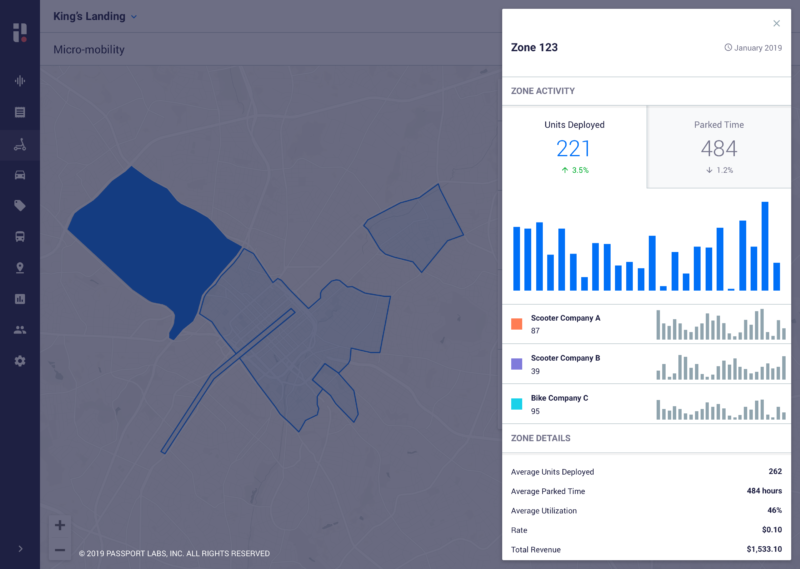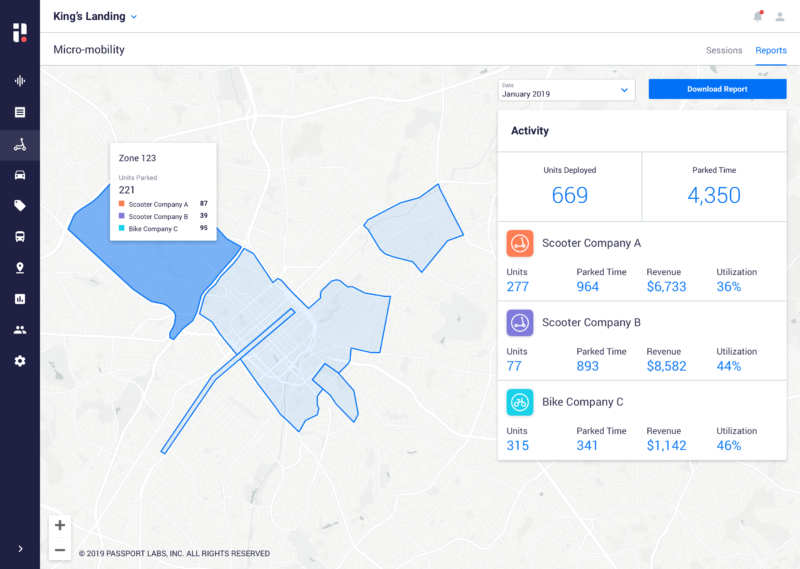Three Major Cities Partner with Passport and Shared Scooter Company on First-Of-Its-Kind Micro-Mobility Management Solution
Initial scooter-share pilots in Charlotte, Detroit and Omaha are creating a framework for future micro-mobility programs

Micro-mobility options like scooters are seeing explosive growth due to the unique benefits they bring to the commuting experience. This rapid introduction of micro-mobility has created new challenges for cities to manage the supply and use of these vehicles. Responding to this shift in urban mobility, cities are looking for innovative approaches to embrace the adoption of scooters and drive positive outcomes such as reducing congestion, providing first mile/last mile solutions, improving pedestrian safety and increasing mobility options in underserved areas.
Today, Charlotte, Detroit and Omaha announce a collaborative pilot program to manage micro-mobility in a new way, through sharing best practices and leveraging Passport’s mobility platform. With this solution, the cities can maintain visibility and control over scooter deployments and better manage their curbs, while enabling mobility providers like Bird, Lime, Spin and Razor to more flexibly and conveniently manage their fleets.
Pioneering this new approach to micro-mobility management, these cities will be the first to apply parking principles, data analysis, and a software platform to charge for scooter parking in order to balance the supply, demand and distribution of scooters. Instead of capping scooter volumes or imposing flat fees, this methodology and technology from Passport allow each city to incentivize behavior by charging for curb space fairly across all modes of mobility. Just as cities charge cars to park at the curb, they can apply an existing digital parking infrastructure for scooters.
The first-of-its-kind software platform from Passport will leverage data from micro-mobility providers and allow cities to:
- Analyze scooter distribution and usage patterns
- Power curbside pricing and payments
- Manage scooters to address city-level objectives like equitable access and first/last mile solutions for transit

Focused on the needs and challenges of cities, Passport has invested $5 million to help cities build the digital infrastructure necessary to coordinate complex urban transportation ecosystems. Passport’s work alongside its clients helps cities keep pace with technological innovation and more effectively integrate services to improve urban mobility offerings. Leveraging Passport’s mobility platform, cities will now have the ability to effectively work with private entities to quickly integrate new transportation services.
“Working with Passport, we can now gather insight on how our citizens are using these new forms of mobility and be more strategic about managing scooters using supply/demand economics,” said Mark de la Vergne, Chief of Mobility Innovation for the City of Detroit. “With this pilot program, we are now connected to a network of cities facing the same challenges and we can effectively work together to develop a new regulatory model that can be scaled nationally.”

“Our goal at Lime is to provide communities with sustainable, innovative transportation options that help improve access to mobility while reducing congestion,” said Evan Costagliola, Director of Transportation Partnerships at Lime. “Through this partnership, we’re excited to work collaboratively with Passport, Charlotte, Detroit and Omaha to establish a mutually-beneficial, tailored system that introduces the right number of scooters at the right locations to best serve residents and visitors.”
Charlotte, Detroit and Omaha are already part of Passport’s existing base of nearly 600 partnerships with municipalities, universities, and private operators worldwide. As the largest facilitator of curbside payments in North America, Passport works closely with clients to effectively manage urban mobility and charge for access to the curb with current products, including:
- Mobile payments for parking
- Digital parking permits
- Enforcement software
- Public transit mobile ticketing
“While our relationships with these cities began with mobile payments for parking, permits, and enforcement, it soon became apparent that there was much more we could do together to improve urban mobility in each city,” said Bob Youakim, Passport CEO. “We will continue to help each city define their needs for curb management, be it through the management of scooters, first/last mile services or the integration of new connected technologies that create a seamless relationship between city officials and residents."
To learn more about the pilot program and receive updates on results, visit passportinc.com/micro-mobility.
About Passport 
Passport is transforming mobility management for cities, empowering them to create more livable and equitable communities. Passport’s mobility platform enables clients to digitally coordinate all modes of transportation and implement real-time, data-centric management of their curbside and streetspace through its enterprise software. Trusted by nearly 600 cities, universities and agencies, including Chicago, Toronto, London, Los Angeles, and Miami, Passport is one of the fastest growing companies on the Inc. 500 and Deloitte Technology Fast 500 lists. Passport is backed by Bain Capital Ventures, Grotech Ventures, MK Capital, and Relevance Capital. For more information, visit passportinc.com.







Comments
There are no comments yet for this item
Join the discussion